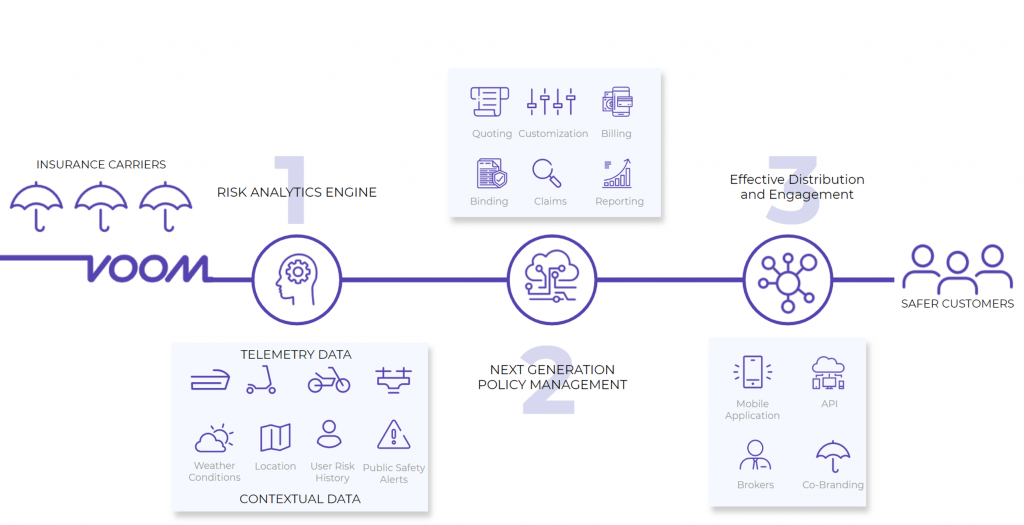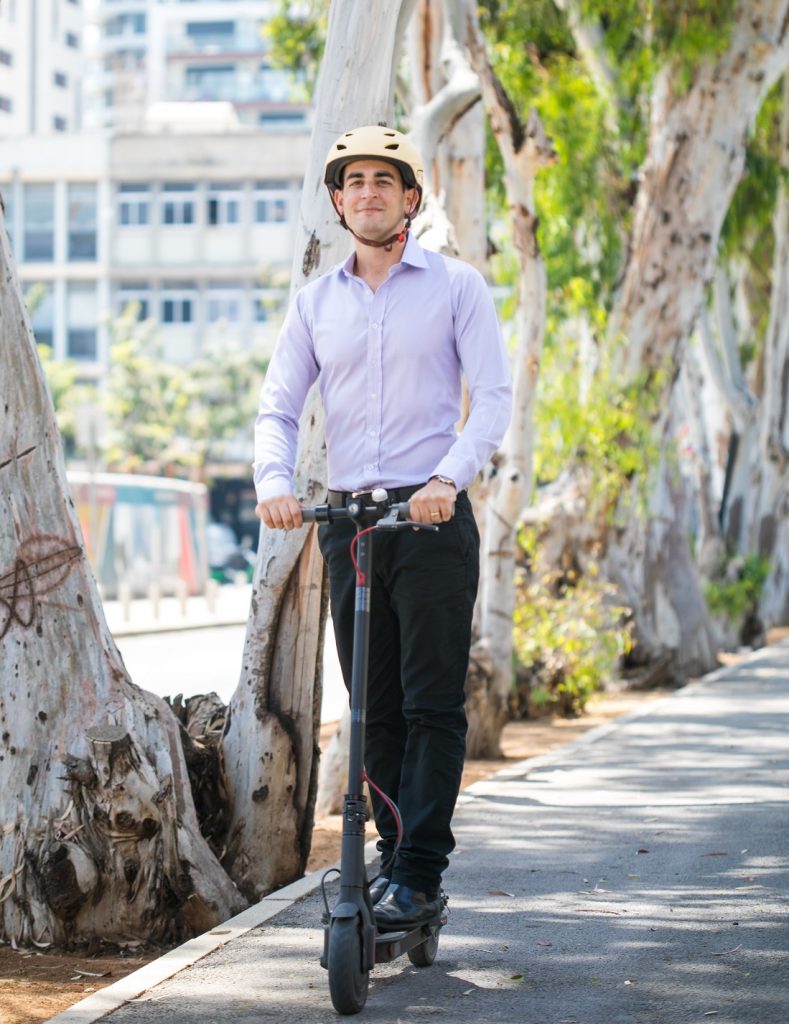In Tel Aviv, San Francisco, Washington D.C. and many more cities around the globe, e-scooters have been boosting our daily mobility. Yet, this new mode of transportation comes with a perilous downside. In 2018, more than 1,500 people were injured in e-scooter related accidents across the US, according to a recent study. In Israel alone, the number of deaths that involved personal electric vehicles rose from seven in 2017 to 19 in the following year, just when e-scooters pioneered the local market.
Despite the risk, adequate insurance coverage for e-scooters and other personal transportation devices is missing. Enter Voom, an Israeli insurance platform for specialized mobility, that is developing an on-demand, telematics-based solution for “everything you can ride, fly or sail”.
SEE ALSO: US E-Scooter Startup To Run Pilot Program In Tel Aviv, Paris
The company – which recently closed a $5 million Series A funding round led by Arbor Ventures, with participation from F2 Capital, Verizon Ventures, Kaedan Capital, and Plug and Play Venture – aims to cover third-party liability, property and personal accidents for various modes of specialized mobility. This includes drones, small private planes, small boats, motorcycles or e-scooters, on an individual per-use basis.

“In all of these markets that are considered a ‘niche’, although they are accounting for billions of dollars in premiums, insurance is really lagging behind,” CEO Tomer Kashi tells NoCamels. Insurance companies currently do not differentiate between customer’s individual risk profiles. “It is like going to the supermarket and everyone pays the same for their shopping cart, no matter what they are buying – it’s not a great idea,” Kashi points out.
To solve this problem, Voom’s solution will include two pillars: an on-demand and per-use basis combined with an individual AI-risk analysis.
“For many modes of mobility the insurance product already exists. However, the entire underwriting and risk profiling is very primitive,” Kashi explains. “Let’s say I have a jetski. One person is using it almost every day, and another one uses it only twice a year. There is no reason that they should pay the same.”

With Voom, every payment is tied not only to the actual use, but also to the personal risk. “That means a safer user will pay much less for the service,” the CEO says.
Such an individual risk assessment is especially crucial for new mobility modes like e-scooters. Upon agreeing to a rental service company’s terms and conditions, riders are not covered in case of an accident. Here, Voom discovered a gap in the market.
“Since it is such a new risk, no insurance company knows yet how to underwrite and calculate it efficiently. So there is no insurance solution for it at all. This is again where we come into play,” the CEO says to NoCamels. “We offer exactly the right insurance that is accurate according to the actual risk of the ride, based on the telemetry data from the e-scooter and on external data such as weather conditions or types of roads.”
Tech company and licenced insurance broker

Through Voom’s overall platform, the company is able to calculate a risk score for each and every use of a device. For this, it derives relevant telemetry data of location points, acceleration and even driving behavior or “almost crashes” from the vehicle itself or from the user’s phone.
But the company does not stop there. “On top of that, we have created our own cloud-based insurance IT-system. So the entire policy management is built by ourselves from scratch,” highlights Kashi. In contrast to the legacy IT-infrastructure many insurers still rely on today, a cloud-based software platform enables Voom to operate efficiently at minimal cost. Lastly, the company also distributes its products to the customers directly, using a mobile app as a user interface. Aside from being a tech startup, Voom is already a licenced insurance broker in all 50 US States.
In the future, Kashi reveals, Voom “could also partner with ride sharing platforms as distributors for our insurance to their users.” Since the product is still in the works, no price calculation is official to this date. But assuming the average cost of an e-scooter ride between three and four USD, he says, the insurance per use “must be much less than one dollar”.
Sign up for our free weekly newsletter
SubscribeAn industry momentum
But do customers really benefit more from per-use solutions than from annual insurance plans that are based on the collective average cost? The answer is “not everyone,” the CEO admits to NoCamels. “Yet, we are in a position today, in which 90 percent of the customers are cross-subsidising the ten risky others. Once you make it on-demand, it will be cheaper for most of the users, but not for all of them.”
Investor Lior Simon, vice president and head of Israel at Arbor Ventures, believes that Voom’s solution is going to fill a substantial gap. “Insurance is a given across every traditional mobility category. However, coverage offerings clearly haven’t kept up with shifting consumer behaviors and emerging risks, such as those associated with micro mobility usage,” he said in a statement released by Voom.
“We live in a mobile world. Everything is instant and people are used to purchasing things on-the-go in a personalized fashion. You are not really keen on TV channels, you have Netflix instead and you choose exactly what you want to see. The same applies here. Not everybody has to have the same insurance,” CEO Kashi explains.
Changing consumer behaviour, which has been altering the rules of many major industries for good, is now also moving the notoriously slow insurance sector. “We do see many insurance companies in the market now who are copying the on-demand model. It really is an industry momentum – insurance innovation in general and on-demand insurance specifically. With Voom, we do it to verticals that are really overlooked. It’s a big opportunity in which customers are very underserved.”
From drones to specialized mobility
Kashi and his business partner Ori Blumenthal first met in Talpiot, an elite Israeli Defense Forces (IDF) training program for recruits with outstanding academic abilities in sciences and leadership. Both have a background in physics and computer sciences. “We didn’t come from the insurance world, but we were keen on solving a complex problem,” Kashi remembers. “This is how we fell in love with insurance.”

After its founding in 2016, the company’s first product on the market was Skywatch.AI, an on-demand insurance solution for drones. Seeing an uptake in this sector encouraged the partners to extend their service to other forms of specialized mobility.
The Israeli startup is now based in San Francisco and has about 15 employees.
A “win-win” situation
Voom hopes to collaborate with top insurance carriers to offer mobility insurance for all types of transport. “For drones we are already working with Starr, the largest aviation insurance carrier in the US”, says Kashi. “For all of the other verticals we are now in discussions with professional carriers and we are looking to work with the best.”
Kashi is convinced that such collaborations are a “win-win” situation. “We are serving the customers and they are happy, because they get something that hasn’t existed until today. And for the carriers it is also very good, because we bring them new revenue streams based on data they couldn’t acquire by themselves”
Voom’s new products for specialized mobility will first launch in the US as their main target market. Based on their performance, the insurtech aims to expand to other countries. According to Kashi, Skywatch.AI, the company’s first product for drones “is working so well in the US, that we are now considering to export it to other countries, including Israel”.
Related posts

Editors’ & Readers’ Choice: 10 Favorite NoCamels Articles

Forward Facing: What Does The Future Hold For Israeli High-Tech?

Impact Innovation: Israeli Startups That Could Shape Our Future




Facebook comments